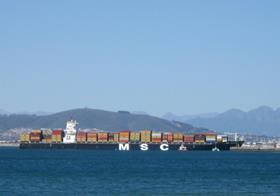
The first significant shipment of containers carrying fresh produce to Europe since the South African transport workers’ strike began almost three weeks ago has left Cape Town.
The shipment consists mainly of containers which have been stranded in South Africa’s container terminals since the beginning of the strike.
Now in its third week after unions rejected a revised offer from transport authority Transnet, the strike has caused widespread chaos in South Africa's ports, with the conventional specialised reefer terminals being the only export channels operating throughout.
Logistics service providers have, meanwhile, dismissed a report that South African exporters of avocados will increasingly turn to airfreight in order to get their fruit out of the country.
'At best they can get very limited volumes away by air and this is not really an option,' says GoReefers' Dalena Engelbrecht.
It is pointed out that airfreight capacity is very limited and the cost is extremely high. 'It is far more conceivable that avocado exporters who have switched to containers during the past year, will now return to conventional specialised shipping,' says Anton du Preez of Anlin Shipping.
Avocado exporter Afropro says that it only uses airfreight as an emergency to fulfill contracts and keep customers happy. 'We shipped containers from Cape Town this weekend and the airfreight was only a stopgap measure,' explains Wiedze Kruger.
With more workers having returned during the past week, it is likely that the container shipping programmes will continue to improve over the next week or so.
The Lars Maersk is now on the water and is due to arrive in Tilbury, UK on 8 June and will dock in Rotterdam a day later. Sources say the vessel is mostly carrying containers which were left behind by the Dal Kalahari, which short-shipped in Cape Town when the strike began.
Elsewhere, the MSC Lara is reported to have left Durban with between 150 and 200 refrigerated containers destined for Europe, and will now call in Port Elizabeth and Cape Town. The next vessel will be the Mol Caledon.
Meanwhile, conventional reefer terminals and specialised reefer shipping continue to be the saving grace of the embattled South African fresh produce export industry.
Growers, exporters and reefer shipping specialists have been working closely together to schedule additional vessels which have been loading without any problems at conventional reefer terminals since the beginning of the strike.






No comments yet